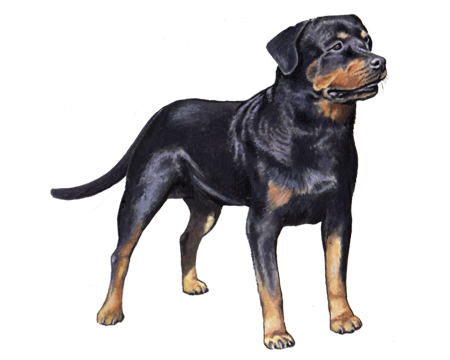
Fila Brasileiro
Filas Brasileiros are calm, courageous dogs known for their protective nature. They are devoted to their families and make loyal companions to experienced pet parents.
Interested in discovering if your dog is a Fila Brasileiro?
Check out Wisdom Panel's DNA tests.

Fila Brasileiro Traits
General Appearance
The Fila Brasileiro is a large molosser-type dog with a rectangular, compact body. They often have a "sad" expression due to their deep-set eyes, large ears, and drooping eyelids and skin.
Coat and Coloring
Filas have short, dense coats that are smooth and close to the body. They come in brindle, fawn, and black. Some have black masks called “boca negra” or white marks on their feet, chest, or tail tips.
Distinctive Physical Traits
Notable traits of the Fila Brasileiro include:
- A massive, heavy head
- Hind quarters are taller than shoulders
- Large, pendant, v-shaped ears
- A strong, muscular neck and body
- Thick, loose skin
Filas also have an interesting way of moving, called a camel step. When they walk, the legs on the same side move (rather than diagonal legs), producing a swaying of the trunk.
Fila Brasileiro Temperament
Filas are fiercely loyal dogs that get along great with children. Their courage and protective instincts make them excellent watchdogs. However, they can be possessive and territorial. They don't take well to strangers and can mistakenly feel the need to defend their family from guests. For these reasons, this breed is recommended only for very experienced dog owners.
These pups have a high prey drive, so it's best to keep them in an enclosed space and away from small animals, including pet cats.


Fila Brasileiro History
The exact origins of the Fila Brasileiro are unknown. However, experts believe the breed likely descended from English Mastiffs and large Iberian breeds, such as the Spanish Mastiff, Rafeiro do Alentejo, Cão de Gado Transmontano, or Cão de Castro Laboreiro brought to Brazil during the colonial period.
The Fila worked on plantations and ranches, protecting livestock from large predators, protecting property, wrangling cattle, and tracking down runaway slaves. The breed follows three standards, developed by three different clubs, the first of which was written in 1946.
Though they can be very loving toward their families, the Fila is classified as a dangerous breed in some countries and is banned in those places.
Fila Brasileiro Care
Nutrition
The Fila Brasileiro does well on high-quality dog food formulated for their age, size, and activity level. In particular, puppies may benefit from a large-breed growth diet. These specially formulated diets help prevent large breed dogs from growing too fast, which may decrease the likelihood or severity of hip dysplasia as they age.
To help Filas maintain a healthy weight, measure their meals to avoid overfeeding and keep treats to 10% or less of their daily calories.
Grooming
The Fila's short coat is a breeze to maintain. An occasional brushing and bath are all that's needed to keep them looking their best.
The breed's long pendant ears may mask the signs of an ear infection. Check their ears regularly and clean when needed to remove wax build-up and debris. Additionally, nail trims and dental care should be part of their grooming routine.
Exercise
Don't be fooled by their bulky physique. Filas are athletic, quick dogs that need lots of daily exercise to stay fit and happy. Long walks, games of fetch, and agility courses are great ways to keep this breed active.
Training
Filas are intelligent dogs that respond well to consistent training, positive reinforcement, and a firm but gentle approach.
In addition to obedience training, this breed will benefit from early socialization. Getting them comfortable with different people and environments when they're young will help them grow into well-adjusted adult dogs.
Breed Group
Guard
Dogs of the Guard Group were bred to guard people and property. They are often quick to learn and these intelligent, capable animals make solid companions.























